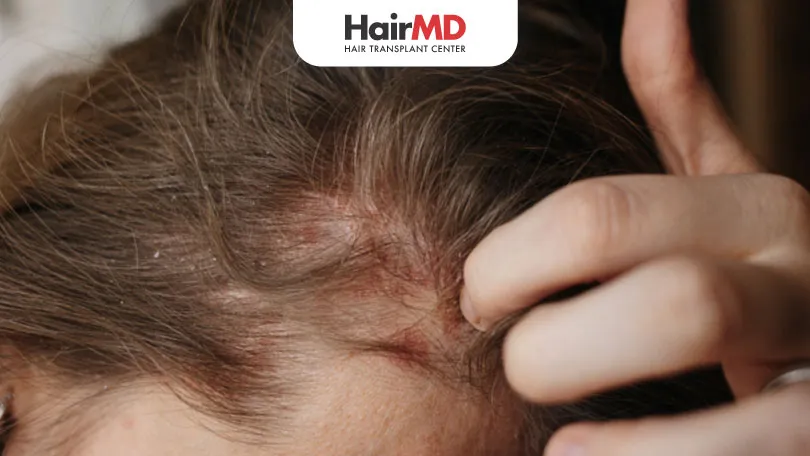9th Jan, 2024

What’s covered in the article?
- Scalp Eczema vs. Psoriasis: Know the Difference
- Conclusion
Scalp Eczema vs. Psoriasis: Know the Difference
|
Scalp Eczema |
Psoriasis |
| Scalp eczema is caused by genetic and environmental factors. | Psoriasis is an autoimmune disease, which causes the skin cells to grow fast. |
| Eczema can affect any region of the skin, but more commonly on hands and legs. | Psoriasis mostly affects the scalp region, the elbows, knees, palms, soles and back. |
| Heat exposure causes more sweating, which can lead to a flareup of eczema. | Since UV light from the sun (UVB) helps in slowing down the growth of skin cells and reducing immune activity in patches, exposure to sunlight can help relieve psoriasis. |
| It causes severe itching, and scratching hard may lead to bleeding from the skin. | It causes itching along with a stinging or burning sensation. |
| The skin gets red and inflamed. Rough patches and nail scratch marks may be seen all over the scalp. | Red patches caused by psoriasis have silvery scales and may appear thick and raised. |
| Use of home based remedies and hair dye are the most common causes. Skin irritants like soaps and disinfectants cause or aggravate eczema. Allergens like dust, pollen, dandruff and certain foods can also lead to eczema. | Risk factors such as stress, infections, injury, medications, etc can trigger autoimmunity and psoriasis. |
| Scalp eczema can occur at any age. | Scalp psoriasis commonly occurs in the age group of 15 to 65. |
| Scalp eczema treatment includes topical corticosteroids to reduce inflammation and frequent use of mild shampoos. Certain prescription medicines help relieve moderate to severe itching while medical treatments like light therapy are effective in treating this condition. | Scalp psoriasis treatment includes the use of topical and injectable corticosteroids, salicylic acid based shampoos, as also light therapy and medicines. |
Do You Know?
Nearly 250 Patients Visit HairMD
Everyday For Various Hair Concerns?
(You are one click away from flawless skin)
Meet Our Dermatologists
Conclusion
Further Reading
Itchy Scalp and Hair Loss: Causes, Treatments, and Prevention
Itchy scalp and hair loss can be troubling, hinting at deeper scalp and hair health issues. Discover the connection in this comprehensive guide.
Dandruff Fungus Treatment
Learn how dandruff and fungus impact scalp health. With HairMD, you can get expert advice on causes, treatments, and prevention tips to maintain a healthy, flake-free scalp.
Helmet Use and Hair Loss: What You Need to Know
Does wearing a helmet cause hair loss? Understand the connection, debunk myths, and explore preventive tips with expert insights from HairMD.
Top Causes of Hair Loss in Women and How to Address Them
Discover the key causes of hair loss in women, including hormonal changes, stress, and nutritional deficiencies. Learn effective solutions and treatments with HairMD experts.
Have thoughts? Please let us know
We are committed not only to treating you, but also educating you.











